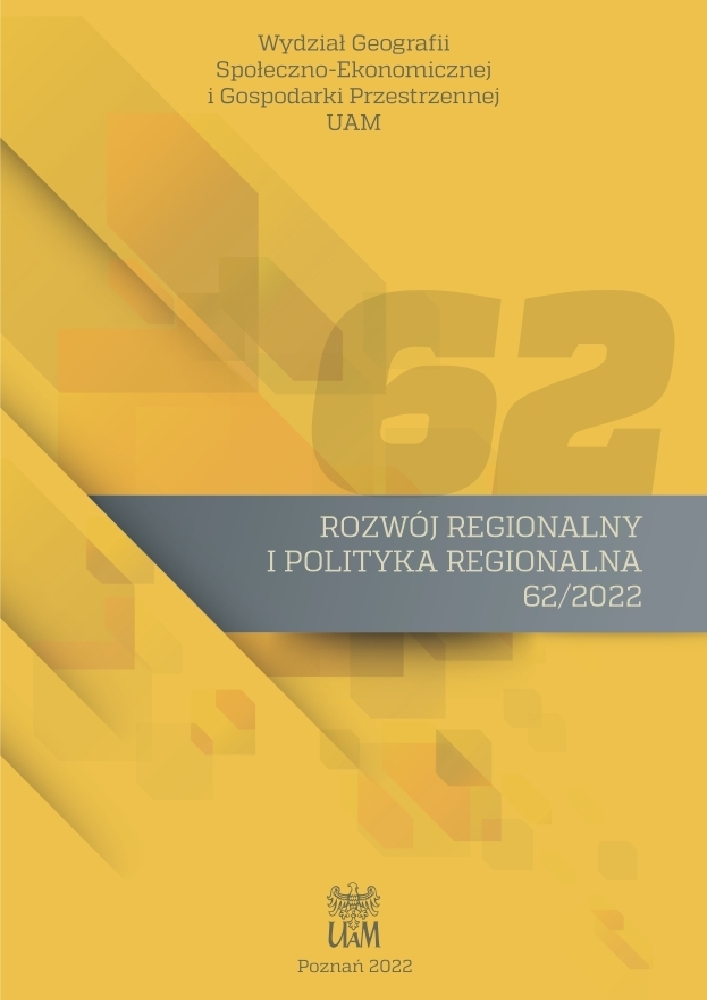Abstract
Short-term rental has become an alternative to the traditional hotel offer and is, to an increasing extent, becoming the first choice for travelers around the world. The main objective of this paper is to present the supply aspect of the short-term rental market in the Greater Poland Voivodeship. The analysis used data from the Airbnb website, which enables the rental of premises for days from private persons. The diversification of short-term rental supply in the voivodship was presented in the poviat system and covered the period from September 2021 to August 2022. The facilities offered for short-term rental in the region were usually larger in area than typical forms of accommodation in registered accommodation establishments. In line with the nationwide and global trend, most of the facilities were concentrated either in large cities and their immediate location, or in areas attractive to tourists. The location of the properties offered on the Airbnb platform was consistent with the location of registered accommodation facilities. The supply of short-term rental in the voivodship was most often one or two-room apartments or houses, less often studio properties or large facilities with at least five rooms. The properties were fairly well equipped with access to a kitchen. Most of the offers guaranteed a parking space and Internet access. In most counties, Airbnb properties were usually only rented for a maximum of a quarter of the year, and the hosts did not set a minimum rental period. The average fee per night in a rented property varied, but it did not exceed PLN 500. Despite the voices that criticize the development of short-term rental in the tourism industry due to the creation of dangerous socio-economic processes on the occasion of changes in the urban fabric of cities or unfair competition for hotel operators, the supply of short-term rental in the Greater Poland Voivodeship seems to be an interesting alternative to the offer of the hotel industry.
References
Adamiak C. 2022. Najem krótkoterminowy w Polsce w czasie pandemii COVID-19. Czasopismo Geograficzne, 96(1): 9-32. https://doi.org/10.12657/czageo-93-01
AirDNA. 2022. AirDNA Data: How it Works (https://www.airdna.co/airdna-data-how-it-works; dostęp: 11.11.2022). https://doi.org/10.2307/j.ctv224tzxk.12
Czernek K., Wójcik D. 2017. Gospodarka współdzielenia z perspektywy przedsiębiorców sektora turystycznego. Handel i Marketing, 1, 3(368): 66-76.
De Cantis S., Parocco A.M., Ferrante M., Vaccina F. 2015. Unobserved tourism. Annals of Tourism Research, 50: 1-18. https://doi.org/10.1016/j.annals.2014.10.002
Doling J. 2019. "Not for Housing" Housing: Widening the Scope of Housing Studies. Critical Housing Analysis, 6, 1: 22-31. https://doi.org/10.13060/23362839.2019.6.1.450
Dolnicar S. 2018. Peer-to-peer accommodation networks: Publishing the boundaries. Goodfellow Publishers, Oxford. https://doi.org/10.23912/9781911396512-3454
Freytag T., Bauder M. 2018. Bottom-up touristification and urban transformations in Paris. Tourism Geographies, 20(3): 443-460. https://doi.org/10.1080/14616688.2018.1454504
Gołębska E. 2018. Sieć ryzyka inwestycyjnego na rynku nieruchomości. Oficyna Wydawnicza Politechniki Białostockiej, Białystok.
Górska A., Mazurczak A., Strączkowski Ł. 2021. Lokalny rynek najmu mieszkań. Wydawnictwo UEP, Poznań. https://doi.org/10.18559/978-83-8211-101-9
Kadi J., Hochstenbach C., Lennartz C. 2020. Multiple property owenership in times of late homeownership: a new conceptual vocabulary. International Journal of Housing Policy, 20, 1: 6-24. https://doi.org/10.1080/19491247.2019.1697514
Kamiński M. 2019. Zarządzanie najmem lokali w praktyce. Wydawnictwo C.H. Beck. Warszawa.
Kokot S. 2019. Nowe tendencje na rynku najmu nieruchomości mieszkaniowych. Nieruchomości w Przestrzeni, 5, 2: 47-61.
Kowalczyk-Anioł J. 2018. Koncepcja gentryfikacji turystycznej i jej współczesne rozumienie. Prace Geograficzne, 154: 35-54. https://doi.org/10.4467/20833113PG.18.009.8965
Kowalczyk-Anioł J. 2020. Turystyfikacja zasobów mieszkaniowych historycznych dzielnic śródmiejskich. Przykład Krakowa. Studia Miejskie, 35: 9-25. https://doi.org/10.25167/sm.1014
Kowalczyk-Anioł J., Pawlusiński R. 2018. Sharing economy w przestrzeni polskich metropolii i miast turystycznych na przykładzie AIRBNB. Konwersatorium Wiedzy o Mieście, 3(31): 15-22. https://doi.org/10.18778/2543-9421.03.02
Łaszek J. 2013. Rozwój i finansowanie sektora nieruchomości w Polsce. Bezpieczny Bank, 4(53): 9-51.
Pawlicz A. 2019. Ekonomia współdzielenia na rynku usług hotelarskich. Niedoskonałości. Pośrednicy. Regulacje. Uniwersytet Szczeciński, Szczecin.
Pawlicz A., Kubicki R. 2017. Sharing economy development path in non-urban areas. The case of hospitality product in Polish national parks. Ekonomia i Środowisko, 4, 63: 166-176.
Pawlicz A., Vrtodusic Hrgovic A.-M. 2020. Spatial issues of sharing economy in Polish acccomodation market. Ekonomia i Środowisko, 1(72): 87-106.
Pawlusiński R. 2017. Ekonomia współdzielenia: istota zjawiska oraz wyzwania dla sektora turystyki w miastach. [W:] M. Drewnik, M. Mika (red.), Człowiek i jego działania. Spojrzenie geografa. Prace dedykowane Profesorowi Włodzimierzowi Kurkowi. Instytut Geografii i Gospodarki Przestrzennej Uniwersytetu Jagiellońskiego, Kraków, s. 179-191.
Przedstawicielstwo Komisji Europejskiej w Polsce. 2022. Najem krótkoterminowy pod kontrolą (https://poland.representation.ec.europa.eu/news/najem-krotkoterminowy-pod-kontrola-2022-11-07_pl; dostęp: 12.11.2022).
Rolnik R. 2013. Late Neoliberalism: The Financialization of Homeownership and Housing Rights. International Journal of Urban and Regional Research, 37, 3: 1058-1066. https://doi.org/10.1111/1468-2427.12062
Skalska T., Markiewicz E., Pędzierski M. 2016. Konsumpcja kolaboratywna w obszarze turystyki. Próba prezentacji zjawiska na rynku polskim. Folia Turistica, 41: 165-190. https://doi.org/10.5604/01.3001.0010.4007
Strategia rozwoju turystyki w województwie wielkopolskim do 2020 roku. 2016 (https://bip.umww.pl/292---k_91---k_207---strategia-rozwoju-turystyki-w-wojewodztwie-wielkopolskim; dostęp: 3.09.2022).
Szreder J., Walentynowicz P. 2020. Nieruchomości wakacyjne jako innowacyjna forma kreowania wartości przez dewelopera. [W:] P. Wróbel (red.), Sukces organizacji w warunkach gospodarki cyfrowej. Strategie, procesy i projekty. UG, Gdańsk, s. 157-171.
Wachsmuth D., Weisler A. 2018. Airbnb and the rent gap: Gentification throught the sharing economy. Environment and Planning, A, 50(6): 1147-1170. https://doi.org/10.1177/0308518X18778038
Walas B. 2019. Turystyczny najem krótkoterminowy w ocenie interesariuszy lokalnych. Biuletyn KPZK PAN, 275: 49-62.
https://bdl.stat.gov.pl/bdl/start (dostęp: 30.08.2022).
http://hotelcombined.pl (dostęp: 30.08.2022).
http://www.airbnb.pl/ (dostęp: 30.08.2022).
http://www.airdna.co/ (dostęp: 30.08.2022).
License
Copyright (c) 2022 Agnieszka Mrozińska

This work is licensed under a Creative Commons Attribution 4.0 International License.

